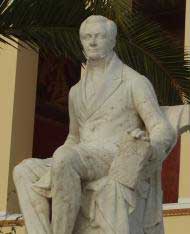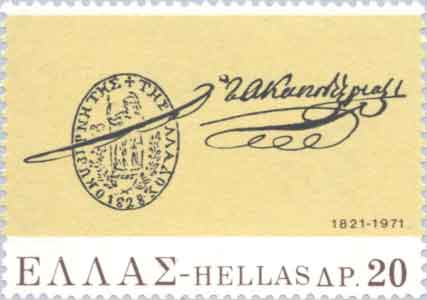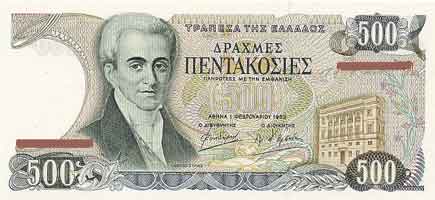John Capodistria (), a common picture of the great Greek governor John Capodistria, (in Greek Ioannis Antonios Kapodistrias or Ιωάννης Καποδίστριας, in Italian Giovanni Antonio Capo d'Istria, Count Capo d'Istria, Russian граф Иоанн Каподистрия) (February 11, 1776 - October 9, 1831), Greek-born diplomat of the Russian Empire and later first head of state of independent Greece, was born in Corfu (Kerkira) in the Ionian Islands, which were at the time of his birth a possession of Venice.
A statue of John Capodistria in Panepistimiou Street, Athens Capodistria was educated at Padua in Italy and inherited the Venetian title Count Capo d'Istria from his father, Antonio (The title originates from Capo d'Istria, the Italian name for the port of Koper, Slovenia). In 1803, when France under Napoléon Bonaparte conquered Venice, Capodistria was appointed Secretary of State of the Septinsular Republic, the French-controlled government of the Ionian Islands. In 1809, however, Capodistria deserted the French cause and entered the service of Alexander I of Russia. He attended the Congress of Vienna as a Russian diplomat and helped negotiate the 1815 peace treaty between France and Russia. In the same year he was appointed joint Foreign Minister of Russia (with Karl von Nesselrode).
Capodistria visited his Ionian Islands homeland, by then under British rule in 1818, and in 1819 he went to London to discuss the islanders' grievances with the British government, who told him that the islands were none of Russia's business. Capodistria became increasingly active in support of Greek independence from the Ottoman Empire, and in 1822 this led to his resignation as Foreign Minister. Capodistria retired to Geneva, where in 1827 he learned that the newly-assembled Greek National Assembly had elected him, as the most illustrious Greek-born politician in Europe, as the first head of state of the newly-proclaimed Greek Republic. The title he assumed was kivernitis (Governor), rather than proedhros (President), to avoid giving offence to the monarchist powers whose support Greece needed. After touring Europe to rally support for the Greek cause, Capodistria landed at Nafplio in January 1828. It was the first time he had ever set foot on the Greek mainland, and he knew almost nothing about the situation in Greece - where fighting against the Ottomans was still going on - or the realities of Greek politics, which were riven by factional and dynastic conflicts. The country was bankrupt and the Greeks were unable to form a united national government. Capodistria's aristocratic style and his tendency to favour his relatives and other Greeks from the Ionian Islands (which were still under British rule) and Phanariots (Greeks from Constantinople) for government positions soon made him unpopular. He underestimated the political and military strength of the Capetanei (Commanders) who had led the revolt agains Turkey in 1821, and who had expected a leadership role in the post-revolution Government. When a rebellion led by the turbulent guerilla fighters from the Peloponnese broke out, he called in Russian troops to suppress it, which offended Greek patriotic sentiment.
The Seal and Signing of Capodistria, Greek Stamp, 19.10.1971, 150 years since the Revolution of 1821. In 1831 Capodistria made the fatal mistake of imprisoning Petros Mavromichalis, the Bey of the Mani Peninsula, one of the wildest and most rebellious parts of Greece. This was a mortal offence to the Mavromichalis clan, and on Oct. 9 1831 (Sept. 27 in the Julian Calendar) Capodistria was assassinated by Petrobey's brother and nephew on the steps of the church of Saint Spyridon in Nafplio. He was succeeded as Governor by his younger brother, Augustinos Kapodistrias.
Capodistria on the Greek 20 lepta (20 cent) coin
500 Drachmae, Greece 1983 Capodistria is greatly honoured in Greece today, and the University of Athens is named "Capodistrian" in his honor. However, many people argue that he was a failure as a national leader. The chaos of the first Greek republic eventually led Britain, France and Russia to insist on Greece becoming a monarchy before they would agree to support its independence. Birthplace of Ioannis Kapodistrias, In Greek
Russian and Soviet Foreign Ministers Afanasy Ordin-Naschokin | Artamon Matveyev | Vasily Golitsyn | Fyodor Golovin | Peter Shafirov | Gavrila Golovkin | Andrey Osterman | Alexey Bestuzhev-Ryumin | Mikhailo Vorontsov | Nikita Panin | Alexander Bezborodko | Feodor Rostopchin | Alexander Vorontsov | Adam Jerzy Czartoryski | Nikolay Rumyantsev | John Capodistria | Karl Robert Nesselrode | Alexander Gorchakov | Nicholas de Giers | Alexis Lobanoff de Rostoff | Mikhail Muravyov | Vladimir Lambsdorff | Alexander Izvolsky | Alexander Sazonov | Pavel Milyukov | Leon Trotsky | Georgy Chicherin | Maxim Litvinov | Vyacheslav Molotov | Andrey Vyshinsky | Andrey Gromyko | Eduard Shevardnadze | Andrey Kozyrev | Yevgeny Primakov | Igor Ivanov | Sergey Lavrov
 |
|
|||||||||||||||








